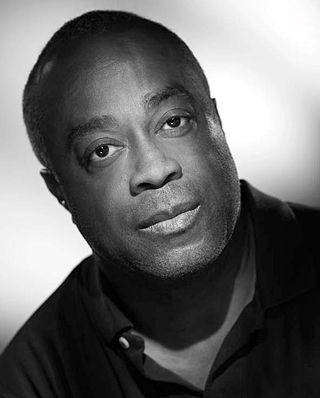
Queer is an umbrella term for people who are not heterosexual or are not cisgender. Originally meaning 'strange' or 'peculiar', queer came to be used pejoratively against LGBT people in the late 19th century. Beginning in the late 1980s, queer activists, such as the members of Queer Nation, began to reclaim the word as a deliberately provocative and politically radical alternative to the more assimilationist branches of the LGBT community.

Charles Burnett is an American film director, film producer, writer, editor, actor, photographer, and cinematographer. His most popular films include Killer of Sheep (1978), My Brother's Wedding (1983), To Sleep with Anger (1990), The Glass Shield (1994), and Namibia: The Struggle for Liberation (2007). He has been involved in other types of motion pictures including shorts, documentaries, and a TV series.

Paris Is Burning is a 1990 American documentary film directed by Jennie Livingston. Filmed in the mid-to-late 1980s, it chronicles the ball culture of New York City and the African-American, Latino, gay, and transgender communities involved in it.

Tongues Untied is a 1989 American experimental documentary film directed by Marlon T. Riggs, and featuring Riggs, Essex Hemphill and Brian Freeman. The film seeks, in its author's words to, "...shatter the nation's brutalizing silence on matters of sexual and racial difference."
Craig Detweiler is a writer, filmmaker, and cultural commentator. He is dean of the College of Fine Arts and Production at Grand Canyon University in Phoenix, Arizona.

Middle Eastern cinema collectively refers to the film industries of West Asia and part of North Africa. By definition, it encompasses the film industries of Egypt, Iran, Bahrain, Iraq, Israel, Jordan, Kuwait, Lebanon, Palestine, Oman, Qatar, Saudi Arabia, Syria, United Arab Emirates, and Yemen. As such, the film industries of these countries are also part of the cinema of Asia, or in the case of Egypt, Africa.
Millennium: Tribal Wisdom and the Modern World is a 1992 documentary television series of ten one-hour episodes celebrating the lifeways and worldviews of small scale non-technological societies as the last of them face their inevitable accommodation with the 'modern world'. The Western world's desire to remake other societies into its own image robs our modern world of the gifts of other cultures. By exploring the values and different worldviews that hold many tribal societies together, the Millennium series reflects on what the modern world can learn from tribal societies as we all face the challenges of the next millennium: harmony with the natural world and one another, humility and tolerance, and a sense of belonging.

Ebrahim Hatamikia is an Iranian film director, screenwriter, cinematographer and actor. Hatamikia is known for films depicting the Iran–Iraq War's impact on Iran. His films are considered some of the best ever made in the Iranian war cinema and most notable for their attention to social changes brought about by the war. Also, he is best-known for his explorations of the trauma by the war; both on returning soldiers and those who await them, unable to mourn effectively without knowing the fate of their loved ones.

Compañeros is a 1970 Italian/Spanish/French international co-production Zapata Western buddy comedy film directed by Sergio Corbucci. The film stars Franco Nero, Tomas Milian, Jack Palance and Fernando Rey. The soundtrack for the film was written by Ennio Morricone.
Arab cinema or Arabic cinema refers to the film industry of the Arab world. Most productions are from the Egyptian cinema.
Religion and geography is the study of the impact of geography, i.e. place and space, on religious belief.

Layth Abdulamir is an Iraqi-French filmmaker born on 24 October 1957 in Iraq. He studied film in Paris, France, from 1977 to 1980, and in Kiev from 1980 to 1986. Since 1994, he defended his dissertation at the Rylsky National Academy of Sciences of Ukraine,. He received his PHD degree in Cinematic Critic he has made several documentary films for various TV channels in France and for Dubai TV in the United Arab Emirates (1999-2004). In 2021, Layth Abdulamir's book Extreme cinema, transcending the borders of aesthetics was published by Arwegh مؤسسة أروقة للدراسات والترجمة والنشر Editions in Cairo.

An ethnographic film is a non-fiction film, often similar to a documentary film, historically shot by Western filmmakers and dealing with non-Western people, and sometimes associated with anthropology. Definitions of the term are not definitive. Some academics claim it is more documentary, less anthropology, while others think it rests somewhere between the fields of anthropology and documentary films.

DokuFest is an international documentary and short film festival held in the Kosovo city of Prizren, held annually during early August. It was founded in 2002 by a group of friends. It has since grown into a cultural event that attracts international and regional artists and audiences. Films are screened throughout the eight-day festival and accompanied by programs, activities, and workshops.

Ethnocinema, from Jean Rouch’s cine-ethnography and ethno-fictions, is an emerging practice of intercultural filmmaking being defined and extended by Melbourne, Australia-based writer and arts educator, Anne Harris, and others. Originally derived from the discipline of anthropology, ethnocinema is one form of ethnographic filmmaking that prioritises mutuality, collaboration and social change. The practice's ethos claims that the role of anthropologists, and other cultural, media and educational researchers, must adapt to changing communities, transnational identities and new notions of representation for the 21st century.
Paths of Memory is a 2009 documentary film directed by José Luis Peñafuerte. The film won the 2011 Magritte Award for Best Documentary Film.

The Cinema of Bolivia comprises the film and videos made within the nation of Bolivia or by Bolivian filmmakers abroad. Though the country's film infrastructure is too small to be considered a film industry, Bolivia has a rich film history. Bolivia has consistently produced feature-length films since the 1920s, many of which are documentary or take a documentary approach to their subject. Film historian José Sánchez-H has observed that the predominant theme of many Bolivian films is the country's indigenous cultures and political oppression.
Wu Tsang is a filmmaker, artist and performer based in New York and Berlin, whose work is concerned with hidden histories, marginalized narratives, and the act of performing itself. In 2018, Tsang received a MacArthur "genius" grant.
Kumu Hina is a 2014 American LGBTQ related documentary film co-produced and co-directed by Dean Hamer and Joe Wilson. It is based on the story of Hina Wong-Kalu, and stars Wong-Kalu, Haemaccelo Kalu and Hoʻonani Kamai. The film premiered at the Hawaii International Film Festival on April 10, 2014, and had its television debut on Independent Lens in May 2015.
Queer art, also known as LGBT+ art or queer aesthetics, broadly refers to modern and contemporary visual art practices that draw on lesbian, gay, bisexual, transgender, and various non-heterosexual, non-cisgender imagery and issues. While by definition there can be no singular "queer art", contemporary artists who identify their practices as queer often call upon "utopian and dystopian alternatives to the ordinary, adopt outlaw stances, embrace criminality and opacity, and forge unprecedented kinships and relationships." Queer art is also occasionally very much about sex and the embracing of unauthorised desires.












